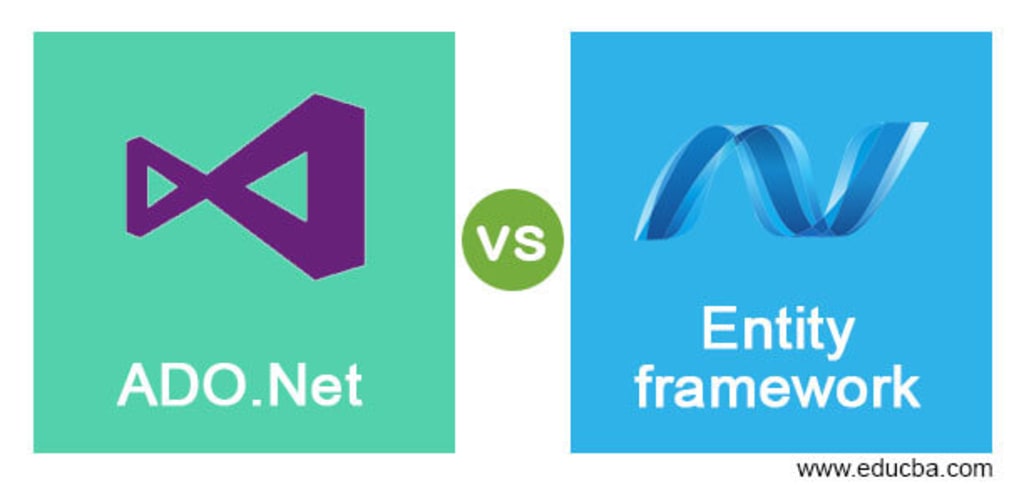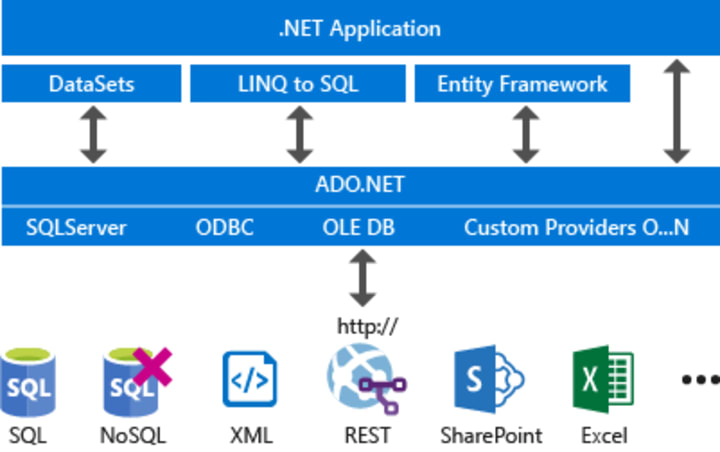.Net core with Entity frameworks .Net core with ADO.NET
What are the differences between ?

Both Entity Framework and ADO.NET are data access technologies in the .NET Core framework. Here are some of the differences between the two:
Object-Relational Mapping (ORM): Entity Framework is an ORM technology that allows you to map your database tables to C# classes, whereas ADO.NET provides a set of low-level data access APIs to interact with databases.
Complexity: Entity Framework abstracts away a lot of the complexity of working with databases and provides a higher level of abstraction, making it easier to work with databases. ADO.NET is a lower level data access technology, which means it requires more code to perform the same operations as Entity Framework.
Performance: ADO.NET is generally considered faster than Entity Framework because it is a lower-level data access technology. However, the difference in performance may not be significant, and it depends on how you use the technology.
Support for different databases: Entity Framework has built-in support for a variety of databases such as SQL Server, Oracle, MySQL, and SQLite, whereas ADO.NET provides a more generic API that can work with any database.
LINQ support: Entity Framework supports LINQ, which allows you to write queries in C# code and execute them against the database. ADO.NET does not have built-in support for LINQ, although you can use LINQ to SQL or LINQ to DataSet to achieve similar functionality.
Database-first vs Code-first approach: Entity Framework supports both database-first and code-first approaches to create database schema and models. In database-first approach, the models are generated from an existing database schema, while in code-first approach, the database schema is generated from the code. ADO.NET primarily follows the database-first approach, where you create your database schema manually, and then use ADO.NET to interact with it.
Code readability and maintainability: Entity Framework's use of LINQ and its higher level of abstraction make it easier to write and maintain code. It is also easier to understand the business logic when using Entity Framework. ADO.NET code can be more verbose and less intuitive, which can make it harder to maintain in the long run.
Maturity and support: Entity Framework has been around for a while and is a mature technology, with a large community of developers using it. This means that there are plenty of resources available online and many third-party libraries built around it. ADO.NET is also a mature technology, but it has been around longer than Entity Framework, and so it is less frequently updated, and there may be fewer resources available for it.
Learning curve: Entity Framework has a steeper learning curve than ADO.NET, especially for developers who are new to ORM technologies. Developers may need to learn new concepts and tools, such as the Entity Framework Designer and LINQ, which can take some time. ADO.NET is more straightforward, and developers can use it with SQL queries, which are more familiar to many developers.
Compatibility: Entity Framework is not fully backward compatible with previous versions of itself, which can create issues when upgrading to new versions. ADO.NET, on the other hand, is more backward compatible, which means that upgrading to new versions is less likely to cause issues.
Testing: Entity Framework can make testing more difficult, especially when using its more advanced features, such as mocking the DbContext. ADO.NET, on the other hand, can be more straightforward to test, as it is a lower-level technology, and tests can be written using standard testing frameworks.

Performance tuning: Entity Framework can be slower than ADO.NET in certain scenarios, such as when executing complex queries with many joins. However, Entity Framework has features that can help optimize performance, such as lazy loading and query caching. ADO.NET, being a lower-level technology, requires more effort to optimize performance, but it provides more fine-grained control over how queries are executed.
Tooling: Entity Framework comes with a set of tools, such as the Entity Framework Designer and the migrations framework, which can make it easier to work with databases. ADO.NET, being a lower-level technology, does not have the same level of tooling built around it, although there are third-party tools available that can provide similar functionality.
In summary, Entity Framework is a higher-level technology that provides a more abstracted way of working with databases, while ADO.NET is a lower-level technology that provides more fine-grained control over how queries are executed. Both have their pros and cons, and the choice between them will depend on the needs of your project and your team's expertise.
-AR
About the Creator
Abdul Razack
Writing has been my passion. Fiction, poetry, and fanfiction are my favorite forms of storytelling. Writing movie reviews is something I enjoy doing.
Feel free to subscribe, leave a comment, and spread the love
Reader insights
Good effort
You have potential. Keep practicing and don’t give up!
Top insight
On-point and relevant
Writing reflected the title & theme






Comments (1)
Good content.